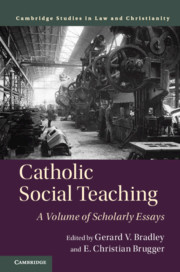Book contents
- Catholic Social Teaching
- Law and Christianity
- Frontispiece
- Catholic Social Teaching
- Copyright page
- Dedication
- Contents
- Contributors
- Acknowledgments
- Abbreviations
- Introduction Contingency, Continuity, Development, and Change in Modern Catholic Social Teaching
- Part I Historical Background
- Part II Leo XIII to Francis: The Documentary Tradition
- Part III Themes in Catholic Social Teaching
- 10 Catholic Social Teaching on the Common Good
- 11 The Universal Destination of the World’s Resources
- 12 The Apostolate of the Laity
- 13 Globalization
- 14 Are Some Men Angels? Modern Catholic Social Thought and Trust in Government
- 15 The Moral Principles Governing the Immigration Policies of Polities
- 16 International Finance and Catholic Social Teaching
- 17 Subsidiarity
- 18 Socialism and Capitalism in Catholic Social Thought
- 19 The Preferential Option for the Poor and Catholic Social Teaching
- 20 Catholic Social Teaching and Living the Christian Life
- Part IV Evaluative and Critical Reflections
- Bibliography
- Index of Names and Subjects
- Index of Ecclesiastical Texts
11 - The Universal Destination of the World’s Resources
from Part III - Themes in Catholic Social Teaching
Published online by Cambridge University Press: 12 July 2019
- Catholic Social Teaching
- Law and Christianity
- Frontispiece
- Catholic Social Teaching
- Copyright page
- Dedication
- Contents
- Contributors
- Acknowledgments
- Abbreviations
- Introduction Contingency, Continuity, Development, and Change in Modern Catholic Social Teaching
- Part I Historical Background
- Part II Leo XIII to Francis: The Documentary Tradition
- Part III Themes in Catholic Social Teaching
- 10 Catholic Social Teaching on the Common Good
- 11 The Universal Destination of the World’s Resources
- 12 The Apostolate of the Laity
- 13 Globalization
- 14 Are Some Men Angels? Modern Catholic Social Thought and Trust in Government
- 15 The Moral Principles Governing the Immigration Policies of Polities
- 16 International Finance and Catholic Social Teaching
- 17 Subsidiarity
- 18 Socialism and Capitalism in Catholic Social Thought
- 19 The Preferential Option for the Poor and Catholic Social Teaching
- 20 Catholic Social Teaching and Living the Christian Life
- Part IV Evaluative and Critical Reflections
- Bibliography
- Index of Names and Subjects
- Index of Ecclesiastical Texts
Summary
This chapter explains the principle of the universal destination of earthly goods as it has been affirmed by the magisterium of the Catholic Church, based upon scriptural and patristic sources and on the thought of Saint Thomas Aquinas, and developed especially since Rerum novarum. The principle is one of the most consistent doctrines of that evolving magisterium, with only minor adjustments of expression, extension to new matters, and differing emphases according to contingent circumstances and the relative force of opposing errors at different times. After a brief introduction (sec. I), the chapter presents in chronological order the evolution of the formulations of the principle before the Second Vatican Council (sec. II) and from there to Pope Francis (sec. III). The purpose of this sort of exposition – chronological and textual – is to furnish the reader with the main texts of the social doctrine of the Church about the principle, so that the stability of the teaching may appear as self-evident. For the main thesis is always the same: the priority of the universal destination of earthly goods as an end, and its compatibility with a strong right to private property as a means.
- Type
- Chapter
- Information
- Catholic Social TeachingA Volume of Scholarly Essays, pp. 267 - 299Publisher: Cambridge University PressPrint publication year: 2019



